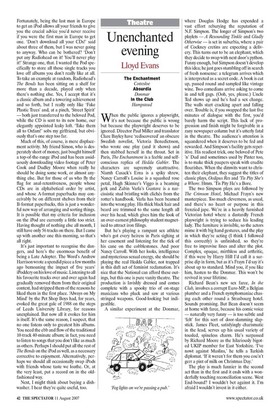Unenchanted evening Lloyd Evans The Enchantment Cottesloe Absurdia Donmar In
the Club Hampstead When the public ignores a playwright, it's not because the public is wrong but because the playwright deserves to be ignored. Director Paul Miller and translator Clare Bayley have 'rediscovered' an obscure Swedish novelist, Victoria Benedictsson, who wrote one play (and it shows) and then stabbed herself in the throat. Set in Paris, The Enchantment is a feeble and selfconscious replica of Hedda Gabler. The characters are supremely unattractive. Niamh Cusack's Erna is a spiky shrew, Nancy Carroll's Louise is a squashed rose petal, Hugh Skinner's Viggo is a beaming jerk and Zubin Varla's Gustave is a narcissistic stud bristling with clichés from the rotter's handbook. Varla has been beamed into the wrong play. His thick black hair and beard are trimmed to the same length all over his head, which gives him the look of an over-earnest philosophy student magnetised to attract iron filings.
But he's playing a rampant sex athlete who's got every heiress in Paris sighing at her casement and listening for the tick of his cane on the cobblestones. And poor Nancy Carroll. With her looks, intelligence and mysterious sexual energy, she should be playing the real Hedda Gabler, not trapped in this daft act of feminist reclamation. It's nice that the National can afford these outings, but this one is pure vanity theatre. The production is lavishly dressed and comes complete with a spooky trio of on-stage musicians who pluck and saw at various stringed weapons. Good-looking but indigestible.
A similar experiment at the Donmar, where Douglas Hodge has expended a vast effort reburying the reputation of N.E Simpson. The longer of Simpson's two playlets — A Resounding Tinkle and Gladly Otherwise — is set in suburbia, where a pair of Cockney cretins are expecting a delivery. This turns out to be an elephant, which they decide to swap with next door's python. Funny enough, but Simpson doesn't develop this idea; he just goes stumbling off in search of fresh nonsense: a telegram arrives which is interpreted as a secret code. A book is cut up, passed round and sampled like vintage wine. Two comedians arrive asking to come in and tell gags. (Doh, yes, please.) Uncle Ted shows up and he's had a sex change. The walls start cracking apart and falling over. Trouble is, if you swapped the last five minutes of dialogue with the first, you'd barely harm the script. This lack of progression and finish might be forgivable in a zany newspaper column but it's utterly fatal in the theatre. The audience's attention is squandered when it deserves to be fed and rewarded. And Simpson's facility gets repetitive. His readiest trick, one beloved of Pete 'n' Dud and sometimes used by Pinter too, is to make thick paupers speak with erudite flourishes. When the dimwits want to christen their elephant, they suggest the titles of classic plays, Oedipus Rex and 'Tis Pity She a Whore. Hmm 'Tis Pity He's a Bore.
The two Simpson plays are followed by The Crimson Hotel, Michael Frayn's new masterpiece. Too much cleverness, as usual, and there's no heart or purpose in this frenzied jape. We're in a heavily furnished Victorian hotel where a dastardly French playwright is trying to seduce his leading lady. The furniture is invisible, so the actors mime it with big hand gestures, and the play in which they're acting (I think I followed this correctly) is unfinished, so they're free to improvise lines and alter the plot. Complex, opaque, mirthless and arthritic, if this were by Harry Hill I'd call it a surprise dip in form, but as it's Frayn I'd say it's about up to standard. Mind you, if you like him, hasten to the Donmar. This won't be revived in your lifetime.
Richard Bean's new sex farce, In the Club, involves a corrupt Euro-MP, a Belgian plumber and a French nymphomaniac chasing each other round a Strasbourg hotel. Sounds promising. But Bean doesn't seem at home with farce, because his comic voice — naturally very funny — is too subtle and 'felt' for this sort of door-slamming slapstick. James Fleet, satisfyingly charismatic in the lead, serves up his usual variety of tousled, spineless charm. He's surpassed by Richard Moore as the hilariously bigoted UKIP member for East Yorkshire. 'I've nowt against Muslins,' he tells a Turkish diplomat. 'If it weren't for them you cou'n't gerr a pint of milk on Christmas Day.'
The play is much funnier in the second act than in the first and it ends with a wonderfully touching reconciliation scene. West End-bound? I wouldn't bet against it. I'm afraid I wouldn't invest in it either.









































 Previous page
Previous page